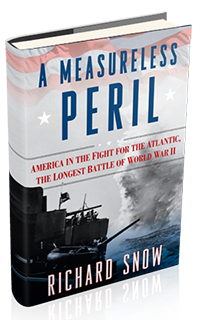A Measureless Peril
“The former editor of American Heritage magazine, Snow writes with verve and a keen eye. He is a kind of John McPhee of combat at sea, finding humanity in the small, telling details of duty.”

Of all the threats that faced his country in World War II, Winston Churchill said, just one really scared him—what he called the “measureless peril” of the German U-boat campaign.
In that global conflagration, only one battle—the struggle for the Atlantic—lasted from the very first hours of the conflict to its final day. Hitler knew that victory depended on controlling the sea-lanes where American food and fuel and weapons flowed to the Allies. At the start, U-boats patrolled a few miles off the eastern seaboard, savagely attacking scores of defenseless passenger ships and merchant vessels while hastily converted American cabin cruisers and fishing boats vainly tried to stop them. Before long, though, the United States was ramping up what would be the greatest production of naval vessels the world had ever known.
Then the battle became a thrilling cat-and-mouse game between the quickly built U.S. warships and the ever-more cunning and lethal U-boats. The historian Richard Snow captures all the drama of the merciless contest at every level, from the doomed sailors on an American freighter defying a German cruiser, to the amazing Allied attempts to break the German naval codes, to Winston Churchill pressing Franklin Roosevelt to join the war months before Pearl Harbor (and FDR’s shrewd attempts to fight the battle alongside Britain while still appearing to keep out of it).
Inspired by the collection of letters that his father sent his mother from the destroyer escort he served aboard, Snow brings to life the longest continuous battle in modern times.
With its vibrant prose and fast-paced action, A Measureless Peril is an immensely satisfying account that belongs on the small shelf of the finest histories ever written about World War II.
“…The battle for the Atlantic was harsh; between 1939 and 1945, hundreds of ships were sunk and 80,000 people perished, mostly drowned or burned. Both sides left their victims to die, or killed them in the water. Admiral Dönitz made sure his men showed no mercy. In late 1939, with the outbreak of war in Europe, he commanded his U-boat crews not to give schnapps or cigarettes to survivors in the lifeboats or to set off flares to summon help. ‘Rescue no one and take no one aboard. Do not concern yourself with the ship’s boats,’ he ordered. ‘Weather conditions and the proximity of the land are of no account. Care only for your own boat and strive to achieve the next success as soon as possible! We must be hard in this war.’
“The Americans were hard, too. The first destroyer to sink a U-boat, the U.S.S. Roper, a World War I-vintage four-stacker, sailed amid the German sailors who were shouting ‘Bitte!’ (‘Please!’) as they floundered in the water begging for rescue. The Roper dropped depth charges instead, then swept up the dead bodies. (They were piled on the deck and covered with a tarpaulin, to discourage looting.)…”
“Far more than a story of battle, A Measureless Peril is a riveting account of the quotidian life of a nation at war. Snow writes of the home-hankering effect of fresh-baked bread tasted aboard a ship far from home; of the affectionate, kidding, and deeply longing letters from men at sea and the women who wait for them; of the pain of seeing other men die and the peculiar pride of doing an unpalatable impossible job well. Richard Snow, the son, and Richard Snow, the father, are two of the most felicitous writers I have ever read. Snow senior’s letters to his wife — wry, insightful, moral, occasionally short-tempered, and most of all, loving — make the war as vivid as this morning’s news. Snow junior’s account of the longest battle of World War II is authoritative, fresh, and heart-stopping. His portrait of his father, whom he sees as emblematic of a generation, is luminous. This is a book about fathers and sons that women will love. It is also a book about the experience of war that no woman will be able to put down.”
“By way of a great raft of sea-stories, each impeccably told and perfectly turned, Richard Snow has transformed the faraway and half-forgotten world of the Atlantic convoys into a narrative as touching and exciting as it is melancholy and memorable. This is a valuable book: few better accounts have ever been crafted about this cruelest of wars, fought for year after year on the most imperturbably cruel of the world’s great oceans.”
Rooftop Review of "A Measureless Peril"
As a former member of the US Navy, and as a licensed Merchant Mariner, I can heartily recommend this book to anyone interested in either the sea, or history. It is obvious that I enjoyed this book.
Full Page Review in the New York Times
“The former editor of American Heritage magazine, Snow writes with verve and a keen eye. He is a kind of John McPhee of combat at sea, finding humanity in the small, telling details of duty.”




